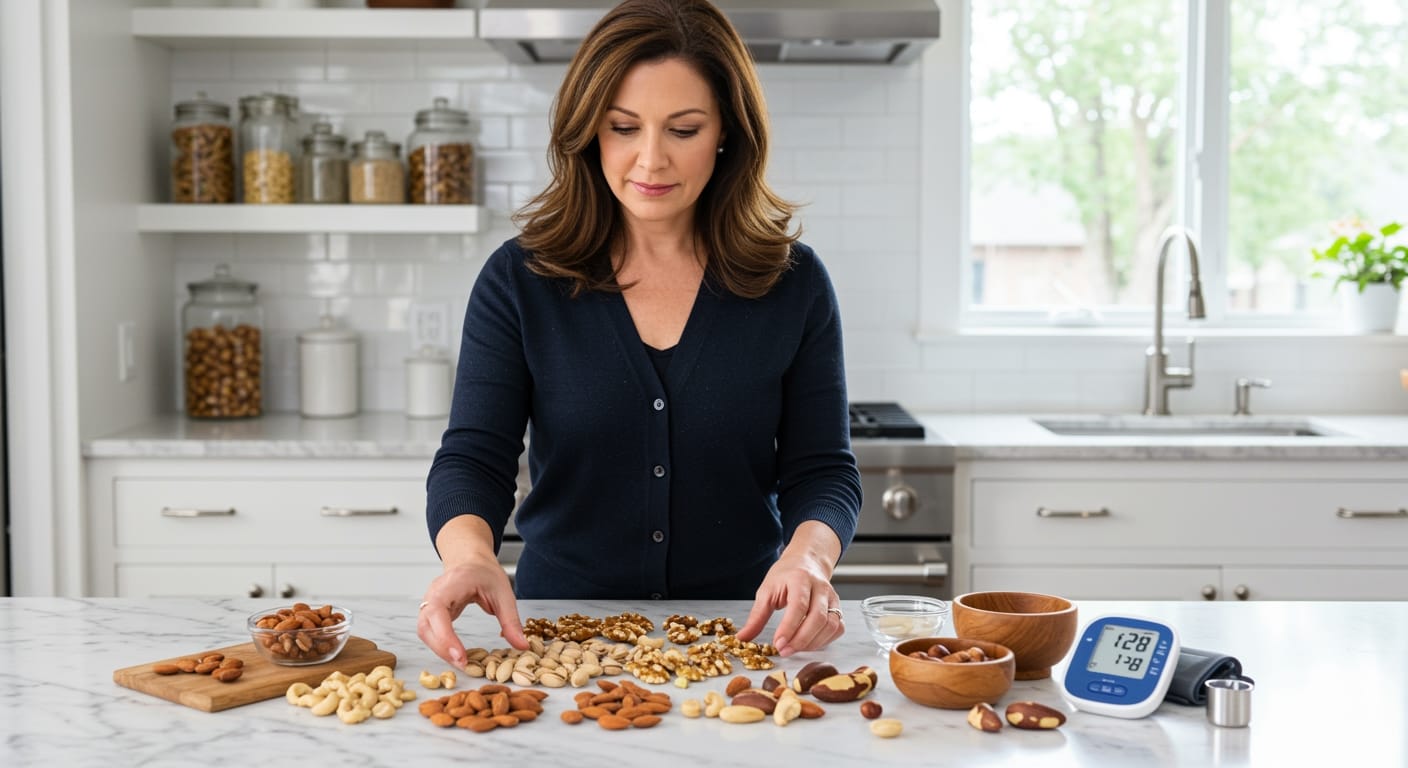✪ Key Takeaway: Most nuts are safe and beneficial for people with hypertension when consumed unsalted and in proper portions.
Introduction
Your doctor just told you that your blood pressure is too high and you need to watch what you eat.
You love snacking on nuts but now you wonder if they are making your condition worse.
Hi, I am Abdur, your nutrition coach and today I am going to explain whether nuts are safe for people with hypertension and which ones offer the most benefits for your heart health.
Do Nuts Raise Blood Pressure?
Most nuts do not raise blood pressure when eaten in their natural unsalted form.
The confusion comes from salted nuts that contain high amounts of sodium.
Sodium causes your kidneys to retain more water, which increases the volume of blood flowing through your arteries.
This extra fluid puts more pressure on your artery walls, leading to higher blood pressure readings.
Raw almonds contain only 1 milligram of sodium per ounce, while salted almonds can contain up to 90 milligrams.
Your body needs less than 2,300 milligrams of sodium per day, and people with hypertension should aim for 1,500 milligrams or less.
When you choose unsalted nuts, you avoid this sodium trap completely.
✪ Pro Tip: Always check the ingredient list and choose nuts with no added salt or sodium.
Which Nuts Actually Help Lower Blood Pressure?
Walnuts are the champions for blood pressure reduction.
They contain high levels of alpha-linolenic acid, an omega-3 fatty acid that helps relax blood vessels.
This relaxation occurs when omega-3s increase the production of nitric oxide in your endothelial cells.
Nitric oxide acts as a vasodilator, causing your blood vessels to widen and reducing the pressure needed to pump blood through them.
Almonds provide magnesium, which helps regulate blood pressure by supporting proper muscle and nerve function.
Magnesium works at the cellular level by blocking calcium channels in smooth muscle cells of your arteries.
This blocking action prevents excessive muscle contraction, keeping your arteries more relaxed and blood pressure lower.
✪ Fact: Just one ounce of almonds provides about 20% of your daily magnesium needs.
How Much Is Too Much?
The ideal portion size for nuts is one ounce per day, which equals about 23 almonds or 14 walnut halves.
Eating more than this amount can lead to weight gain because nuts are calorie-dense foods.
One ounce of mixed nuts contains approximately 170 calories, and these calories add up quickly when you eat multiple servings.
Weight gain increases your risk of developing or worsening hypertension because extra body weight forces your heart to work harder.
Your heart must pump blood to more tissue, and this increased workload raises your blood pressure over time.
Additionally, excess weight can lead to insulin resistance, which affects how your kidneys handle sodium and water balance.
Stick to the one-ounce serving size to get the benefits without the unwanted consequences.
✪ Note: Use a small bowl to pre-portion your nuts instead of eating directly from the container.
Are There Any Nuts to Avoid?
Salted nuts of any variety should be avoided if you have hypertension.
This includes popular snack options like salted peanuts, roasted and salted cashews, and flavored nut mixes.
Many commercial nut products also contain added oils and preservatives that can contribute to inflammation in your blood vessels.
Chronic inflammation damages the inner lining of your arteries, making them less flexible and more prone to plaque buildup.
This damage creates a cycle where your blood pressure rises, causing more inflammation and further arterial damage.
Honey-roasted nuts are another category to limit because they contain added sugars that can contribute to weight gain and metabolic issues.
Choose raw or dry-roasted nuts without any added ingredients for the best health outcomes.
✪ Pro Tip: Read labels carefully as some “lightly salted” nuts still contain significant sodium amounts.
The Bottom Line
Nuts are not only safe for people with hypertension but can actually help improve your blood pressure when chosen and consumed correctly.
The key is in the details: choose unsalted varieties, stick to proper portions, and make them part of a balanced diet rather than a replacement for other healthy foods.
I would love to hear about your experience with nuts and blood pressure management, so please share your thoughts or questions in the comments below.
References
At NutritionCrown, we use quality and credible sources to ensure our content is accurate and trustworthy. Below are the sources referenced in creating this article:
- PMC: Nuts and Cardiovascular Disease
- Frontiers in Medicine: Nuts and Blood Pressure
- MDPI Nutrients: Tree Nuts and Cardiovascular Health





